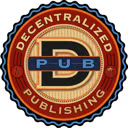
DPub
DPUB is a decentralised publishing platform that aims to simplify the process of creating and distributing content on the Hedera network. It’s designed to empower creators by providing them with the tools to launch NFTs, create token-gated communities, and manage crowdfunding campaigns and DAOs.
The core of DPUB's service is a user-friendly, no-code platform that allows creators to mint their work as NFTs and build communities around their content. Its features include decentralised auctions and a secondary marketplace, which provide creators with new avenues for monetization and passive income through royalties.
DPUB is built on Hedera and utilises the Hedera Token Service (HTS) for minting and managing all NFTs and other digital assets on the platform as well as the Hedera Consensus Service (HCS) to ensure the fair bidding. By leveraging Hedera's high throughput, low fees, and robust security, DPUB offers a scalable and efficient solution for decentralised publishing and creator monetisation.
Project Information
Related Projects

Tradegames is a play-to-earn (P2E) trading simulation game built on the Hedera network, designed to offer a competitive and risk-free environment for users to test their trading skills. The platform allows players to build fantasy portfolios using real-world stock market data and compete against others to see who can achieve the highest portfolio growth over a set period.
To participate in the competitions, users are required to own a "Vault" NFT. These non-fungible tokens (NFTs), minted on Hedera, serve as a player's entry ticket into the game's reward-based tournaments. Winners of these competitions are rewarded with $TG, the platform's native utility token. The $TG token can then be used within the ecosystem to enter exclusive games or for other platform-related activities, creating a self-sustaining game economy.
Developed with support from LimeChain, the platform leverages the Hedera network for its core functions. Both the Vault NFTs and the $TG utility token are Hedera-based. By simulating crypto and stock trading without requiring players to risk actual capital, Tradegames provides an accessible and educational entry point into the world of financial trading, all within a Web3 gaming framework.

Calaxy is a decentralized social marketplace designed to empower creators by giving them direct ownership of their communities and monetization tools. It was cofounded by Spencer Dinwiddie, an active NBA player currently with the Dallas Mavericks, and CEO Solo Ceesay.
The Calaxy platform operates on the Hedera blockchain network with additional support for the Solana blockchain. It enables creators to build personalized mini-applications for users called "Worlds" and has been used by scores of celebrities including NFL superstar Ezekiel Elliot, WWE superstar Mickie James, and pop singer Teyana Taylor.
The customizable Worlds serve as social hubs enabling direct fan engagement through features including social feeds, exclusive content, video calls, and NFT sales. Creators can set their own prices for experiences and subscriptions, eliminating the need for intermediaries.
Calaxy integrates a user-friendly wallet supporting fiat currency, cryptocurrencies, and NFTs, Its native token, $CLXY, serves as a gas and governance token for its underlying "Creator's Galaxy" protocol which allows fans to purchase creator-specific tokens that are redeemable for bespoke interactions and unique content.

Noviqtech is technology firm focused on carbon accounting and supply chain transparency. The company's product offerings include “Carbon Central” and “Noviq AI.” Carbon Central is focused on managing and centralizing carbon-related data and accounting processes for businesses. Similarly, Noviq AI offers exceptional end-to-end transparency and confirmation of product authenticity and processes throughout the entire value chain through the use of artificial intelligence within the firm's service portfolio, thus enhancing data processing, analytics, and decision-making capabilities for core services.
Its platform relies on three key service pillars. The first pillar, “guarantee of origin,” seeks to prove the origin of green resource production in order to highlight sustainability by tracking and tokenizing green hydrogen, sustainable aviation fuel, biodiesel, biochar, and related assets while aligning with industry standards and methodologies. The second, “carbon reporting,” allows users to measure, manage, and tokenise project assets and to effortlessly report and track carbon reduction and avoidance. This allows users unlock revenue opportunities through carbon tokenisation. The third pillar, “supply chain traceability,” allows users to track products throughout their lifecycle, ensuring authenticity and building client trust by highlighting supply chain transparency and demonstrating sustainable and ethical practices.

FMFW.io, which stands for "Free the Money, Free the World," is a centralized cryptocurrency exchange based in the Bahamas. It offers a broad range of trading services, including spot and derivatives markets, margin trading, and staking, with over 400 trading pairs.
On the Hedera ecosystem, FMFW.io provides a trading venue for HBAR, contributing to its liquidity and accessibility for a global user base. The platform features a user-friendly interface, deep liquidity, and cutting-edge matching engine.
FMFW.io emphasizes security with cold storage, multi-factor authentication, and continuous monitoring and implements anti-money laundering (AML) and know-your-customer (KYC) procedures. Beyond trading, it offers staking opportunities, enabling users to earn passive rewards on supported assets.
It also facilitates instant cryptocurrency purchases through numerous payment methods including credit/debit cards, Apple Pay, and Google Pay. Security is a core focus, with the exchange implementing cold storage for assets, multi-factor authentication, and continuous monitoring to safeguard user funds and data.
